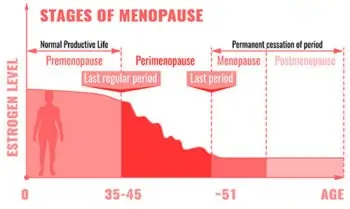
According to an ancient adage, the only things in life that are certain are death and taxes. However, as countless generations of women are aware, menopause must be added to their gender’s shortlist of inevitable occurrences.
The average age of menopause onset in the US is 51. And while menopause still appears to be unavoidable, modern medical research might be on the verge of giving women the option of choosing when they will have to go through it. In other words, we may soon be able to postpone menopause for 15 or 20 years.
What is menopause?
When you hear “menopause” you probably think of hot flashes and irregular periods, but those are actually part of the “menopausal transition,” or perimenopause. Menopause is a time 12 months after a person’s last period. It’s a normal part of the aging process and marks the end of the reproductive years
Because menopause is linked to decreasing progesterone and estrogen levels (hormones produced in the ovaries), a hysterectomy or removal of the ovaries can also trigger menopause.
Menopause unfolds in three phases: perimenopause, menopause itself, and post-menopause.
What happens to a woman during perimenopause?
Perimenopause most often begins between ages 45 and 55. How long it lasts can vary widely from one woman to another, from about 7 years to as long as 14 years. The rate at which this happens is also different for everyone.
During perimenopause, the body’s estrogen and progesterone production decrease. During this process, menstrual periods can become irregular and you may experience “typical” menopausal symptoms such as fatigue, insomnia, diminished sex drive, vaginal dryness, mood swings, chills and night sweats, depression and/or anxiety, weight gain, hair loss, increased facial hair growth, difficulty concentrating, and hot flashes.
What happens during menopause?
Twelve months after your last period you are “officially” in menopause. While entering menopause, bones become less dense, making them more vulnerable to fracture. Also during this time, the body uses energy differently, fat cells change, and it’s easier to gain weight (whether you want to or not
Additionally, menopause increases a woman’s susceptibility to cardiovascular disease (including strokes and heart disease), osteoporosis, i.e., loss of bone density and strength, and Alzheimer’s disease.
What does being post-menopausal mean?
The final stage of this transition is post-menopause. Basically, it is the rest of your life after menopause. In addition to no longer having a menstrual cycle, your menopause symptoms may begin to ease or disappear during this time. However, some women will continue to have symptoms like night sweats and hot flashes for a decade or longer.
So, it would seem that, given the opportunity, most women would enthusiastically choose to delay menopause.
Can menopause be delayed naturally until a woman reaches a later age?

Prolonged breastfeeding, use of oral contraceptives, and, believe it or not, higher levels of education are all associated with a later onset of menopause. Maybe unsurprisingly, smoking tobacco decreases your number of healthy eggs, triggering natural menopause earlier. And women who moderately use alcohol appear to have later menopause than women who don’t drink at all.
Please note: The term “moderate” is subject to differing interpretations. The CDC defines moderate drinking for women as one drink a day. For men, the CDC’s definition of moderate drinking is two drinks per day. That obvious gender inequity is, however, the subject of an entirely different blog.
A diet low in carbohydrates, that includes lots of fruit, vitamin D, fresh legumes, and omega-3 proteins, like oily fish, also seems to result in a somewhat deferred menopause.
Is there a quick and easy way to delay menopause?
Not yet, but…
A more expeditious way to defer menopause could be beneficial, especially for those facing artificially-induced menopause, such as due to cancer therapy.
And that more immediate opportunity to postpone menopause may soon be available.
Biotech company begins a new study on delaying menopause for women undergoing cancer therapy
Celmatix is a young biotech company, led by a woman and primarily focused on women’s reproductive health issues. Celmatix is creating a drug program that, it is hoped, will effectively slow the depletion of a woman’s ovarian reserve. Thereby prolonging both reproductive capabilities and the production of estrogen.
What’s an ovarian reserve?
While still in the womb, female human fetuses are provided with far more than a lifetime supply of eggs. By 20 weeks of gestation, the tiny developing ovarian follicles contain about 5 million eggs. That’s when egg production permanently shuts down. It’s like a bank account from which only withdrawals can be made.
For reasons that remain completely mysterious, attrition reduces egg numbers at birth to between 500,000 and 1 million. From that still ample store, known as the ovarian reserve, an adult woman will actually ovulate only about 400 eggs during the entire reproductive stage of her life.
By the age of 30, a woman will be down to about 12% of the eggs she had in reserve at birth. That’s still far more than enough to support a woman’s reproduction requirements for the next several years, provided her ovaries are not subjected to destructive interferences, such as cancer therapy or ovarian surgery.
One of the primary side effects of cancer therapy, whether chemo or radiation, is a severe reduction in estrogen production. This amounts to the functional equivalent of early menopause.
How this menopausal delaying technology works
Celmatix’s product mimics the anti-Mullerian hormone (AMH), which plays an important role in the development of reproductive organs in embryos of both sexes. While anti-Mullerian hormone levels have been recognized for a couple of decades as an effective way to measure a woman’s ovarian reserve, the use of AMH analogs as menopause-related therapy is brand new.
Celmatix proposes to begin clinical trials in 2023, testing its product first on young women who are undergoing chemotherapy for cancer treatment.
The preservation of such women’s ability to bear children after they have recovered from cancer would, of course, be enormously welcome.
A wider user base could well include older women who are premenopausal and women who simply don’t want to go through menopause’s hardships right now.
That prospective customer population could also include women who want to postpone the higher risks of cardiovascular disease and Alzheimer’s which can accompany menopause.
Not everyone wants to delay menopause
Though this technology is very exciting, by no means will every woman be eager to delay menopause. Some women, perhaps a growing cohort, are beginning to see menopause in a more accepting light. They have reasons, which include:
- Going through menopause can reduce the odds of breast cancer, uterine cancer, and ovarian cancer.
- Menopause means no more dealing with the vicissitudes of premenstrual syndrome, and the pains, both literal and figurative, of menstruation itself.
- No more tampons and no more concern about visible stains. No more unexpected mood trampolines. Freedom to enjoy sex without worrying about contraception.
- No more menstrual migraines, those headaches that coincide with ovulation for about 70% of women.
- And hormone replacement therapy (HRT) may be able to alleviate hot flushes caused by lowered hormone levels.
If menopause means an end to all that, some women might say “bring it on.”
About Dr. Aliabadi
As one of the nation’s leading OB/GYN’s, Dr. Thaïs Aliabadi offers the very best in obstetrics and gynecology, including telehealth appointments. Together with her warm professional team, Dr. Aliabadi supports women’s health through all phases of life. She creates a special one-on-one relationship between patient and doctor.
If you’re looking for medical advice on menopause, menstruation, or related health problems, we invite you to establish care with Dr. Aliabadi. Please click here to make an appointment or call us at (844) 863-6700.
We take our patients’ safety very seriously. Our facility’s Covid-19 patient safety procedures exceed all CDC and World Health Organization recommendations. Masks are required in our office at all times during the coronavirus pandemic.
The practice of Dr. Thais Aliabadi and the Outpatient Hysterectomy Center are conveniently located for patients throughout Southern California and the Los Angeles area. We are in Beverly Hills and near West Hollywood, Santa Monica, West Los Angeles, Culver City, Hollywood, Venice, Marina del Rey, Malibu, Manhattan Beach, and Downtown Los Angeles.















